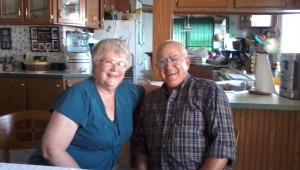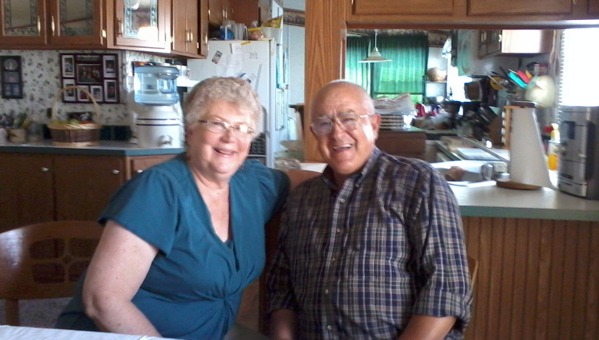
Retired pastors Karen and Rene Calderon moved from Grand Junction, Colo., to a mobile home park in Broomfield, Colo., in September 2000 to be close to their four kids and two small grandkids.
Although the Calderons come from an middle-class background, they’ve enjoyed the sense of community on their crowded street over the last 12 years. “It’s the first time we’ve ever lived in a mobile home park, but it fit our needs,” says Karen, referring to their home’s proximity to their family, which has since grown to include five grandkids. “We love living here. We’re all so close. You know when somebody needs something and you all check on each other.”
Like the time when their neighbor, fresh off back surgery, jumped the fence separating their homes to make sure Karen heard the news about a local tornado warning, and like the time two years ago when neighbors pitched in to help while Rene recovered from hip surgery.
Aware by accident
Over time, the Calderons have developed a more-than-typical neighborly interest in some of their fellow residents. “We discovered local needs almost by accident,” Karen says.
It started two or three years ago when Karen, a fluent Spanish-speaker, helped a concerned Broomfield mother interview Spanish-speaking clients at the local human service agency Broomfield FISH. Karen learned one of the clients’ top priorities was to learn English. So she started teaching English. She also translated at FISH’s satellite food distribution center in her neighborhood. “There was lots of enthusiasm there before it closed,” she says of the satellite center. “It was more coming into contact with need and responding accordingly.”
For his part, Rene, a native of Ecuador, has helped some of his neighbors work toward literacy. He currently tutors one couple separately—the husband gets 30 minutes at a time of Spanish literacy instruction, and the wife gets 30 minutes of English literacy instruction.
Over time, some members of the local immigrant community, especially, have begun to trust the Calderons and see them as friends and advisors. “We don’t do anything full-time,” Karen says. “It’s more as needs arise…Because they are a community of silence and many of them can’t speak English and they’re undocumented.”
One family among many
The Calderons, for example, know of one large family whose children don’t all live with their parents. The two oldest girls live in Latin America. One of the boys lives with family in another state. The rest of the kids live here with their parents. Only one of them can travel without fear to see extended family, because he was born in the United States.
About the CalderonsRene was born and raised in Ecuador and was valedictorian of the first graduating class of the only Protestant high school in Quito, Equador’s capital. At the suggestion of his principal, he attended two years of Missionary Alliance seminary in Ecuador. Before he got kicked out after accruing too many demerits for petty offenses like leaving the lights on after hours, Rene participated in the church’s work with native Ecuadorians through a summer work camp. During the camp he mostly spent his time building latrines and digging wells. “It was the first time I’d seen the poverty of my country,” says Rene, an only child whose father was educated and held a position in Quito’s city government. The director of the work camp happened to also be the basketball coach at Brethren-founded Manchester College (now Manchester University) in Indiana. “He and his wife met in the Peace Corps in Bolivia and he asked me if I wanted to go study in the United States,” Rene recalls. “After a month or two I got these papers in the mail, and a few months after that I got accepted to go to school [at Manchester College]. I don’t know what the papers said because I couldn’t speak English!” Rene arrived in Indiana in September 1962. Two years later, an Indiana native named Karen Gorden enrolled in classes at Manchester. Rene and Karen soon fell in love and married. After Rene graduated they lived off and on for several years in Ecuador, where Rene served as the national director of Alfalit, a faith-based ministry inspired by Frank Laubach’s worldwide efforts to alleviate human suffering through literacy. The Calderons eventually returned to Manchester so Karen could finish her degree. They had two girls and adopted two boys from Ecuador. Rene and Karen are both ordained Brethren ministers. “The Church of the Brethren has an emphasis on service to others, and is one of three historic Protestant ‘peace’ churches,” Karen says proudly. Over the course of their careers, the Calderons have served at the Brethren church’s administrative headquarters and pastored Brethern churches in Puerto Rico; Dayton, Ohio; Chicago, Ill.; Denver, Colo.; and Grand Junction, Colo. lives in Tennessee with relatives. |
“The parents not only support their family here, but also send money [to Latin America] for their daughter’s schooling,” Karen says. “They have relatives living nearby, and they all send money to their father each month.
“They also pay taxes to the IRS…using a Spanish-speaking accountant and a manufactured, not stolen, social security number. They never get called on it by the IRS, I guess because the IRS gets money. Sometimes we only hear about [people in this family’s situation] if we have to treat them in hospitals or emergency rooms, but there’s much more to it than that.”
For a while, Karen drove the mother of this family to get food and Christmas presents for the kids at FISH. “She has a job now as a maid. And her husband works in construction,” Karen says. “To get an appointment at FISH you have to call seven to 10 days in advance, but she doesn’t know when she’ll be off in time to make an appointment, so that’s hard.”
Hope no longer deferred?
Some friends of the Calderons have a daughter who fits the eligibility requirements for the Deferred Action for Childhood Arrivals (DACA) process introduced on Aug. 15 by the U.S. Citizenship and Immigration Services (USCIS): she is currently in school, residing in the U.S., is under 31, has no criminal record, and arrived in the United States before age 16.
According to the USCIS website, deferred action “is a discretionary determination to defer removal action of an individual as an act of prosecutorial discretion” and “does not confer lawful status upon an individual.” DACA lasts for two years, is subject to renewal and makes successful applicants “eligible for work authorization.” DACA’s filing fee is $465 per application.
As the New York Times, CNN and other media outlets reported, thousands of young people in cities across the country lined up on the first day applications were accepted. According to the Chicago Sun-Times, however, “the paperwork to apply for the deferred action is plentiful, and scams are common” so sympathetic groups like World Relief have held workshops to educate potential applicants. The Calderons say reliable sources of information also include Catholic Charities and Univision, but they admit confusion, uncertainty and fear remain.
“People are concerned that it is a two-year deal, and an executive order, and that if Romney is elected, it could be overturned,” Karen says. “And there is a fear that if their data is in the system it could be used against them and lead to their deportation.”
The Calderons have advised friends who could apply for DACA to wait until after the November elections. “But even then nothing is guaranteed,” Karen says.
“We have one friend who is in the Adams 12 school district—he’s from Ecuador, he’s here with a work permit, and applied for a resident visa,” Rene says. “The process has taken longer than 10 years for him. He has two master’s degrees, is the principal of a school here, but he can’t change districts because that would threaten the status of his work permit. He can’t leave for Ecuador because he’s not sure if he could return.
“He and his partner have adopted four kids. They’re both teachers. But his partner is from Argentina and of Italian descent, and he got his Green Card right away, [it seems] because he applied through [his Italian connection]. It took him one month to six weeks to get his residency.”
Karen adds, “The new health care law [the Patient Protection and Affordable Care Act] won’t even help solve the problem, because some [immigrants] aren’t legal residents…Over the last several years, the rules have changed. You used to not have to have a social security number to get a driver’s license, but now people have to show a social security number to get or renew a driver’s license. So now some of them are driving on expired driver’s licenses…driving to work every day scared to death [of being pulled over]. But they have to get to work. The level of fear that these people live with day in and day out is incredible.”
Uncertainty = vulnerability
Recently, the young teenage son of a couple the Calderons know got picked up for shoplifting. His distraught parents contacted a local attorney, who then charged them $750 for an initial consultation.
Thankfully, the parents asked the Calderons to translate the court summons they received for their son. When Karen and Rene heard what the couple’s attorney had done, they got in touch with a lawyer contact of their own. The verdict they got back: the couple’s attorney was grossly overcharging and taking advantage of the couple’s lack of knowledge of the system.
So the Calderons accompanied the couple and their son during his day in municipal court. When the family’s attorney wanted to ask for a continuance, presumably to rake in more fees, the Calderons pushed to have the case decided immediately. It was. The judge ordered the boy to write a letter of apology, pay court costs of $150, and attend a day-long seminar on petty theft. Case closed.
Rene says, “For me the biggest need is to find a way, and it’s not easy because I am an immigrant myself, some kind of a fair way to deal with immigration in this country.”
Karen adds, “Some way for families to be together.”


